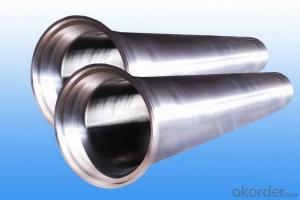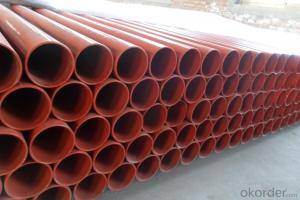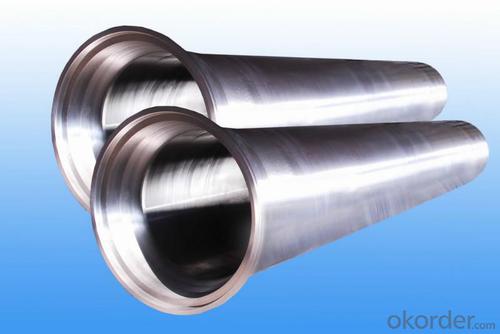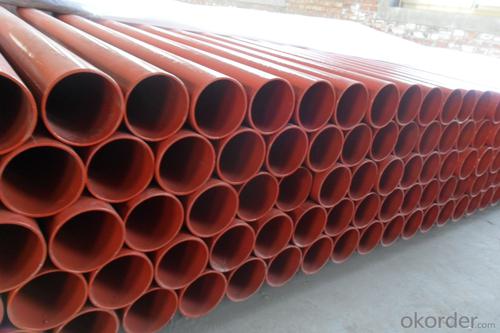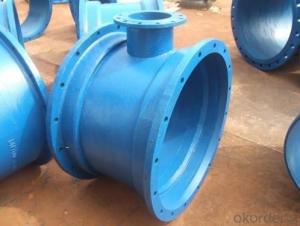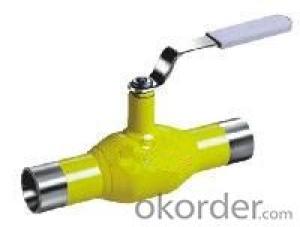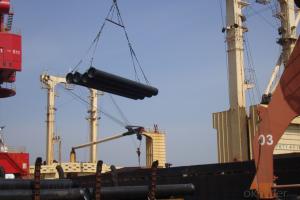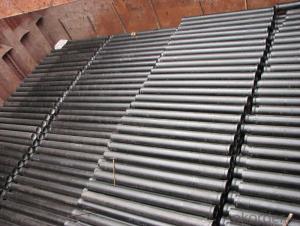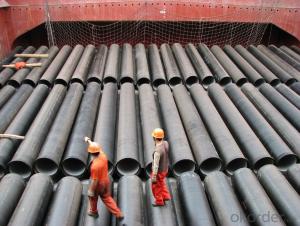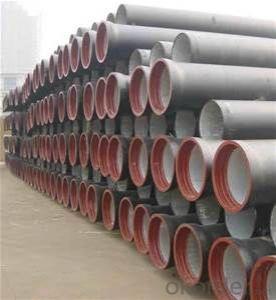Ductile Iron Pipe Class L10 Low Price Good Quality
- Loading Port:
- China main port
- Payment Terms:
- TT OR LC
- Min Order Qty:
- 299 pc
- Supply Capability:
- 10000 pc/month
OKorder Service Pledge
OKorder Financial Service
You Might Also Like
1,Ductile Iron Pipe Description :
1) Pipes confirm to ISO2531,K9 class,T type joint,6m long,with inside cements lining conform to ISO4179, outside Zinc spraying(130g/m2) and bitumen coating(70μm) conform to ISO8179.
2) Pipe ends: Spigot and socket ends, with 100% SBR rubber gaskets accoding to ISO4633
3) we can do third party inspection according to customer's request.
4) Our products have been sold to many international market, such as Middle East and South East Asia and Africa.
2,Main Features of the Ductile Iron Pipe:
·High yield strength
·High tensile Strength
·High corrosion resistance
·Pressure Resistence
·Anti-corrosion
·Installation is convenient
·Satisfy the highest hygienic standards
3,Ductile Iron Pipe Images:
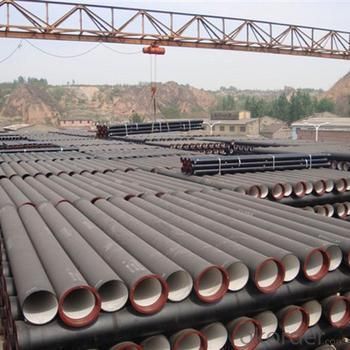
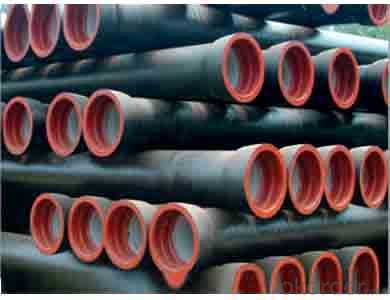
4.FAQ:
We have organized several common questions for our clients,may help you sincerely:
Q: Why would you choose ductile iron pipe rather than other pipe materials?
A:The reasons are obvious for that not only ductile iron pipe possesses the inherent strength and flexibility of ductile iron, combined with proven corrosion protection systems, but also the cost savings can be achieved from design to installation and commissioning.
Q:Why can you guarantee the inner of pipes can’t be corroded?
A: High alumina cement mortar lining and sulphate-resistant cement mortar lining. These two special linings are applicable to inner anti-corrosion for sewage pipes, improving resistance to erosion of the sewage components.
- Q: Can ductile iron pipes be used for underground fuel storage systems?
- Yes, ductile iron pipes can be used for underground fuel storage systems. Ductile iron is a type of cast iron that possesses superior strength, durability, and flexibility compared to traditional cast iron pipes. These properties make ductile iron pipes suitable for various applications, including underground fuel storage systems. Ductile iron pipes are resistant to corrosion, which is essential for underground storage systems that may come into contact with various fuels and chemicals. Additionally, their high tensile strength and resilience allow them to withstand external pressure and loading, ensuring the integrity and safety of the underground storage system. Furthermore, ductile iron pipes have a long lifespan, typically lasting for several decades, making them a cost-effective choice for underground fuel storage systems. They can handle the weight of the stored fuel and any potential ground movements, maintaining the structural integrity of the system over time. However, it is important to note that the suitability of ductile iron pipes for underground fuel storage systems may also depend on other factors, such as local regulations, soil conditions, and the specific fuel being stored. It is always recommended to consult with professionals and adhere to applicable guidelines when designing and installing such systems to ensure compliance and safety.
- Q: Does the cast iron pipe for spheroidal graphite need corrosion protection when laying underground?
- In quality, the spheroidization of cast iron pipes is controlled to be 1-3 (spheroidization rate 80%), so the mechanical properties of the cast iron pipes, ductile iron pipes and finished product libraries can be better improved, with the nature of iron and the properties of steel
- Q: How do ductile iron pipes handle heavy traffic loads?
- Ductile iron pipes possess exceptional durability and have the ability to effortlessly withstand heavy traffic loads. This is primarily attributed to their remarkable strength and flexibility. The incorporation of graphite nodules in the composition of ductile iron allows for greater flexibility compared to traditional cast iron pipes. This enhanced flexibility empowers the pipes to endure substantial traffic loads, including the weight of vehicles traversing over them. Moreover, ductile iron pipes exhibit an elevated load-bearing capacity, enabling them to bear significant weights without experiencing any deformation or structural failure. Consequently, they are well-suited for deployment in areas characterized by heavy traffic, such as highways, bridges, and industrial sites. Furthermore, ductile iron pipes showcase exceptional resistance to external forces, such as vibrations and impacts. These pipes can effectively absorb and distribute these forces across the entire pipe network, thereby averting any potential damage and preserving the overall structural integrity. In conclusion, ductile iron pipes are explicitly engineered to manage the demands imposed by heavy traffic loads. Their strength, flexibility, and load-bearing capacity render them a dependable choice for infrastructure projects where durability and longevity are of utmost importance.
- Q: Can ductile iron pipe be used for irrigation systems?
- Yes, ductile iron pipe can be used for irrigation systems. Ductile iron is a strong and durable material that can withstand the high pressure and constant flow of water required for irrigation systems. It is resistant to corrosion, making it suitable for underground applications where it may come into contact with moisture and soil. Additionally, ductile iron pipes have the advantage of being able to handle heavy loads, which is important for irrigation systems that may require the use of heavy machinery or vehicles. Overall, ductile iron pipe is a reliable and long-lasting choice for irrigation systems.
- Q: Which is better, ductile iron pipe and spray plastic pipe?
- Ductile iron pipe corrosion resistance, strength, it is said that the Ming Dynasty ordinary cast iron works now, and now has a new type of dedicated, can be used, construction becomes very convenient, ductile iron pipe has no effect on water quality. Plastic sprayed steel pipe is a new type of pipeline with higher price.
- Q: What are the different corrosion protection options for ductile iron pipe?
- There are several corrosion protection options available for ductile iron pipes. These include internal linings such as cement mortar or polyethylene encasement, external coatings like zinc or polyethylene, and cathodic protection systems. Each option offers varying levels of protection and is chosen based on the specific needs and conditions of the pipe installation.
- Q: Are ductile iron pipes suitable for installation in rocky or hard soil conditions?
- Yes, ductile iron pipes are suitable for installation in rocky or hard soil conditions. Ductile iron has excellent strength and durability, making it highly resistant to external pressures and impacts. It can withstand the challenges posed by rocky or hard soils, ensuring reliable and long-lasting performance.
- Q: What are the different types of thrust restraints for ductile iron pipe?
- There are several different types of thrust restraints that can be used for ductile iron pipe installations. These thrust restraints are designed to prevent the pipe from moving or separating under the forces generated by internal pressure, external loads, or changes in temperature. 1. Thrust blocks: Thrust blocks are concrete structures that are typically installed at bends, tees, and other changes in direction in the pipeline. They are designed to resist the thrust forces by transferring them to the surrounding soil or foundation. 2. Mechanical restraints: Mechanical restraints, such as tie rods or harnesses, are used to restrain the pipe by exerting an external force on it. These restraints are typically made of steel and can be adjusted to accommodate changes in pipe length or alignment. 3. Pipe anchors: Pipe anchors are devices that are installed at specific intervals along the pipeline to provide resistance against axial movement. They are usually made of steel and are embedded into the surrounding soil or concrete to provide a secure anchor point for the pipe. 4. Thrust collars: Thrust collars are devices that are installed around the pipe to prevent it from moving or separating. They are typically made of steel and are placed at strategic locations along the pipeline to absorb the thrust forces. 5. Restrained joint systems: Restrained joint systems are specialized pipe joints that are designed to resist axial forces. These joints typically have additional features, such as keyways or wedges, that provide resistance against movement. It is important to select the appropriate type of thrust restraint based on the specific requirements of the ductile iron pipe installation. Factors such as the pipe diameter, operating pressure, soil conditions, and potential external loads should be considered when determining the most suitable thrust restraint system. Consulting with a qualified engineer or pipe manufacturer can help ensure the proper selection and installation of thrust restraints for ductile iron pipe.
- Q: Usage of ductile iron pipe expander
- Ductile iron expansion is mainly provided with large flexible, easy installation, the product main material for nodular cast iron, nodular cast iron is mainly through spheroidization and inoculation by spherical graphite, effectively improve the mechanical properties of cast iron, especially the plasticity and toughness increased, resulting in higher than the strength of carbon steel. The material mainly has high strength of plasticity and toughness, and its development at home and abroad is very fast, the output has exceeded cast steel and malleable cast iron, become second only to gray cast iron casting alloy material. Spheroidal graphite is obtained by spheroidizing and inoculation of nodular cast iron. It can effectively improve the mechanical properties of cast iron, especially improve the plasticity and toughness, so as to obtain higher strength than carbon steel.
- Q: Can ductile iron pipes be used in areas with high levels of heavy metal contamination?
- Areas with high levels of heavy metal contamination can indeed utilize ductile iron pipes. Ductile iron, known for its strength and durability, is resistant to corrosion, thus making it ideal for various environmental conditions, including those with heavy metal contamination. The structural integrity and performance of ductile iron pipes remain unaffected by the presence of high levels of heavy metals in the surrounding soil or water. These pipes feature a protective lining, typically made of cement mortar or polyethylene, which acts as a barrier between the pipe and its environment. This lining effectively prevents the leaching of heavy metals into the flowing water. Moreover, ductile iron pipes have demonstrated exceptional resistance to chemical corrosion, including that caused by heavy metals. Consequently, they have been extensively used in industrial settings where heavy metal contamination is prevalent, such as wastewater treatment plants, industrial facilities, and mining sites. However, it is crucial to emphasize the importance of regular monitoring and maintenance for ductile iron pipes, even though they can withstand high levels of heavy metal contamination. These measures ensure that the protective lining remains intact and any potential issues are promptly addressed. In conclusion, ductile iron pipes are a suitable choice for areas with substantial heavy metal contamination. Their strength, durability, and resistance to corrosion make them a reliable option for transporting water and other fluids, even in challenging environments.
Send your message to us
Ductile Iron Pipe Class L10 Low Price Good Quality
- Loading Port:
- China main port
- Payment Terms:
- TT OR LC
- Min Order Qty:
- 299 pc
- Supply Capability:
- 10000 pc/month
OKorder Service Pledge
OKorder Financial Service
Similar products
Hot products
Hot Searches
Related keywords
